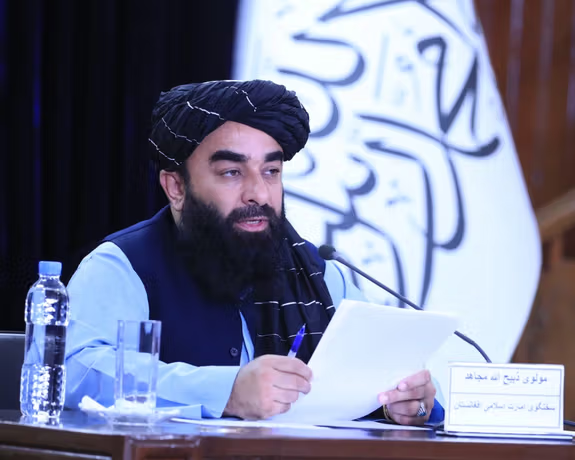Pak Pursuing ‘Regional Destabilisation Project’ On Behalf Of Major Powers, Says Taliban

Zabihullah Mujahid, the Taliban spokesperson, said that Islamabad has embarked on “a project of creating instability in the region” on behalf of major powers.

Zabihullah Mujahid, the Taliban spokesperson, said that Islamabad has embarked on “a project of creating instability in the region” on behalf of major powers.
Mujahid stated that there is no longer any need for regional countries to mediate between the Taliban and Pakistan.
Speaking at an online press conference on Saturday, he said that from now on, the Taliban would directly share developments with regional states, adding that “Iran, Russia, and the Central Asian countries understand the situation.”
Referring to Pakistan’s recent threats, Mujahid said the Taliban, “in coordination with the people, are ready to defend every inch of Afghanistan’s soil.”
He said that during the Istanbul talks, Pakistan attempted to place responsibility for its internal security on the Taliban, which ultimately led to the collapse of the negotiations.
Mujahid, who also serves as spokesperson for Taliban leader Hibatullah Akhundzada, said Pakistan was trying to portray the Tehreek-e-Taliban Pakistan (TTP) issue as something that emerged after the Taliban’s return to power in 2021, whereas it actually dates back at least two decades.
He recalled TTP attacks in Pakistan’s tribal areas and major cities over the past 20 years and said Pakistani military operations against the group had displaced thousands of civilians.
Mujahid said the TTP was formed as a result of Pakistan’s military campaigns and its decision to allow US drone strikes in the tribal regions, insisting that “this issue has no connection to the Afghan Taliban.”
He explained that, in response to Pakistan’s concerns, families linked to migrants from the tribal areas including members of the TTP have been relocated from the Durand Line border regions to central Afghanistan to allow for closer monitoring.
The Taliban spokesperson said that carrying weapons or engaging in “jihad in Pakistan” without the permission of the Taliban’s supreme leader has been “completely banned.” He added that tribal migrants entered Afghanistan long before the Taliban returned to power.
Earlier, Pakistan’s Defence Minister Khawaja Asif said the Taliban’s refusal to sign a written agreement had caused the deadlock in negotiations, adding that there was now no need for further mediation or dialogue.